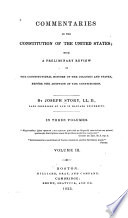 | John Dickinson - United States - 1801 - 450 pages
...certain times of the year, and pursuant to a form and manner pescribed by law. There is no liberty, if the power of judging be not separated from the legislative and executive powers." • f " MILITARY men belong to a profession, which may be useful, but is often dangerous." " The enjoyment... | |
 | William Hazlitt - Great Britain - 1809 - 608 pages
...subject. It was so remarkably to the point, that he would quote it. That great man observes, " When the legislative and executive powers are united in the same person, or in the same body of magistrates, there can be no liberty ; because apprehensions may arise lest the... | |
 | William Cobbett - Great Britain - 1810 - 538 pages
...government be so constituted " as that one man be not afraid of another. " But." says Montesquieu, " when the " legislative and executive powers are '• united in the same person, or in the ' same body of magistrates, there can be ' no Liberty ; because apprehensions ' may arise, lest... | |
 | Great Britain - 1810 - 538 pages
...let us hear what that able and admirable writer Montesquieu says upon this state of things. " vVhen the legislative and executive " powers are united in the same person, " or in the same body of magistrates, " there can be no liberty ; because ap" prehensions may arise, lest... | |
 | Alexander Hamilton, James Madison, John Jay - Constitutional history - 1817 - 570 pages
...reasons on which Montesquieu grounds his maxim, are & further demonstration of his meaning. " When the legislative " and executive powers are united in the same person or body,'' says he, " there can be no liberty, because apprehensions may " arise lest the same monarch or senate... | |
 | James Madison, John Jay - Constitutional law - 1818 - 882 pages
...reasons on which Montesquieu grounds his maxim, are a further demonstration of his meaning. " When " the legislative and executive powers are united in the " same person or body," says he, " there can be no " liberty, because apprehensions may arise lest the same tl monarch or senate... | |
 | United States. Continental Congress - Law - 1823 - 644 pages
...certain times of the year, and pursuant to a form and manner prescribed by law. There is no liberty, if the power of judging be not separated from the legislative and executive powers." " Military men belong to a profession, which may be useful, but is often dangerous." — " The enjoyment... | |
 | Charles de Secondat baron de Montesquieu - Jurisprudence - 1823 - 810 pages
...liberty, it is requisite the government be so constituted as one man needs not be afraid oi another. When the legislative and executive powers are united in the same person, or in the same body of magistrates, there can he no liberty ; because apprehensions may arise, lest the... | |
 | Virginia. Constitutional Convention - Constitutional conventions - 1890 - 928 pages
...jioircr of another department, the fundamental principles of a free Constitution are subverted." And that he did not mean, " that these departments ought to have no partial agency in, or no contrtml over, the acts of each other." And this Number also demonstrates by reference to the British... | |
 | Joseph Story - Constitutional history - 1833 - 800 pages
...truly distinct from both the legislature and executive. — For I agree, that ' there is no liberty, if the power of judging be not separated from the legislative and executive powers.' It proves, in the last place, that as liberty can have nothing to fear from the judiciary alone, but... | |
| |